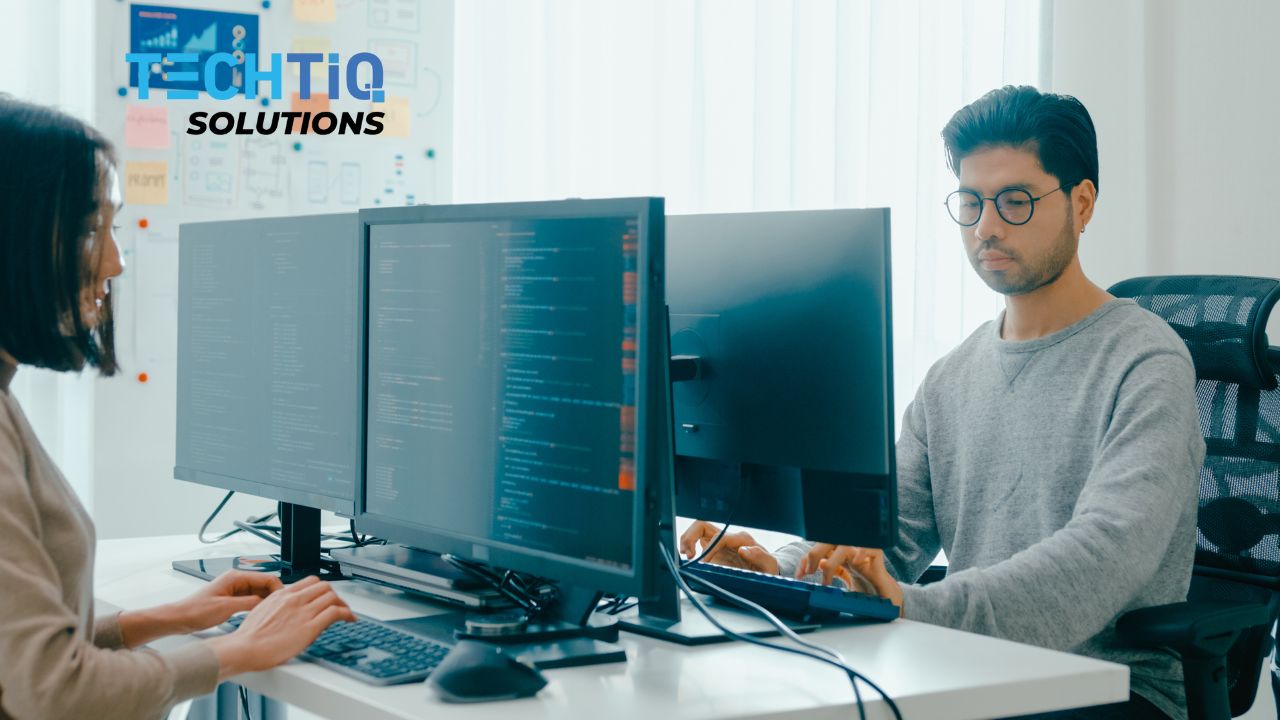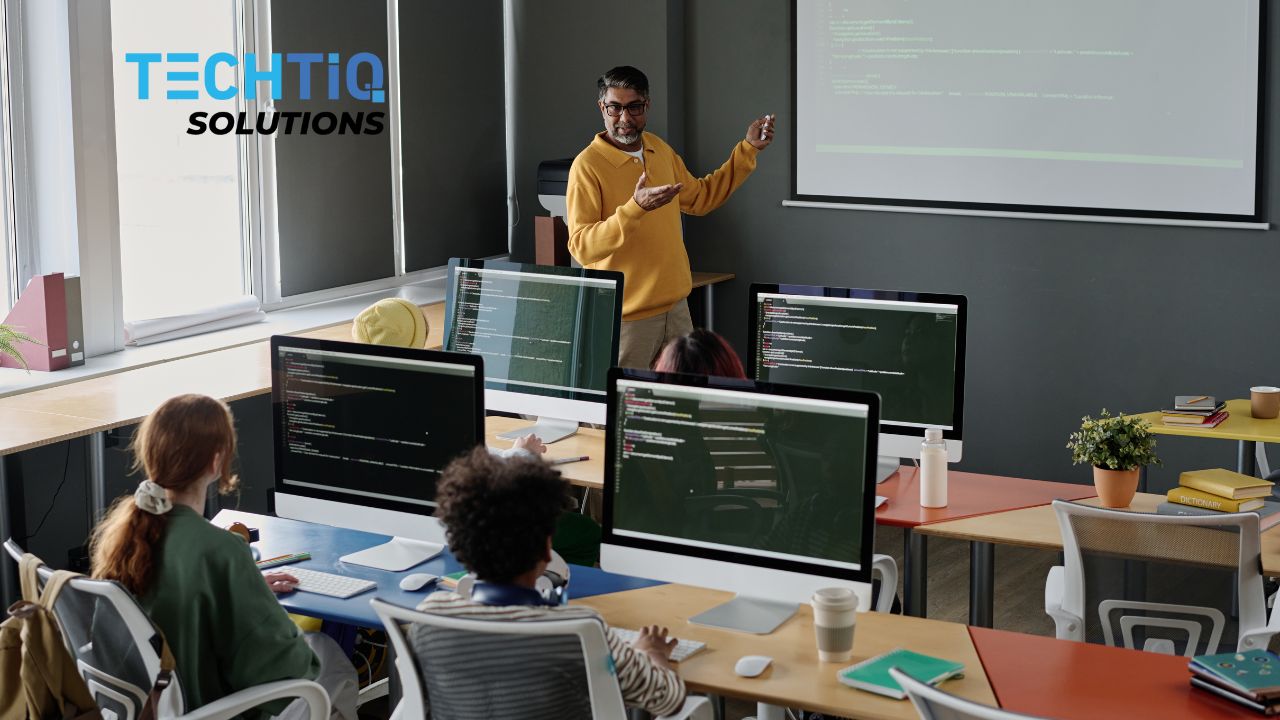Have you ever wondered how your favorite apps, websites, and games actually work? Behind every digital experience, from ordering food online to posting on social media, lies software coding – the invisible force that powers our digital world. But what exactly is software coding, and why does it matter to your business?
In this comprehensive guide, we’ll break down the concept of software coding in plain, easy-to-understand terms, explore its importance in today’s business landscape, and show you how companies like TechTIQ Solutions transform code into powerful business tools.
Key Takeaways
-
Software coding is the process of creating instructions for computers using specialized languages that tell machines what actions to perform
-
Understanding basic coding concepts helps businesses make better technology decisions, even if they don’t code themselves
-
Different coding languages serve different purposes, from web development (JavaScript) to mobile apps (Swift, Kotlin) to AI projects (Python)
-
Effective software development follows a structured lifecycle with planning, coding, testing, and maintenance phases
-
Custom software development offers significant advantages over off-the-shelf solutions for businesses with specific needs
What is Software Coding?
Software coding, often simply called “coding” or “programming,” is the process of writing instructions that tell computers what to do. Think of it as creating a detailed recipe for a computer to follow. Just as a recipe guides you through making a meal with specific ingredients and steps, code guides a computer through performing specific tasks.
These instructions are written in specialized languages that humans can understand and computers can execute. The computer then translates these human-readable instructions into machine code – the binary language of 1s and 0s that computers understand at their most basic level.
Let’s look at a simple example. If you want to display “Hello, World!” on a screen, you might write this line of code in Python:
print(“Hello, World!”)
This single line tells the computer to use its “print” function to display the text “Hello, World!” on the screen. While this example is simple, software coding allows us to create everything from simple mobile apps to complex systems that power airplanes, financial markets, and medical equipment. It’s the foundation of nearly every digital experience we interact with daily.
The Difference Between Coding and Programming
While the terms “coding” and “programming” are often used interchangeably, some industry professionals make a distinction:
-
Coding refers specifically to the act of writing code – the actual typing of instructions using a programming language.
-
Programming is often considered a broader term that encompasses the entire software development process, including planning, algorithm design, coding, testing, and debugging.
For the purposes of this article, we’ll use both terms to refer to the overall process of creating software through written instructions.
Why Software Coding Matters for Businesses
In today’s digital economy, software coding is the backbone of business innovation and efficiency. Here’s why it matters:
Digital Transformation
Businesses across all industries are undergoing digital transformation – the integration of digital technology into all areas of business. Custom software solutions enable companies to:
-
Automate repetitive tasks
-
Collect and analyze valuable data
-
Create personalized customer experiences
-
Streamline operations
-
Reduce costs and increase efficiency
Competitive Advantage
Companies that leverage custom software gain a significant edge over competitors. TechTIQ Solutions helped an e-commerce client develop a custom inventory management system that reduced their fulfillment time by 40% and dramatically improved customer satisfaction scores.
Problem-Solving
At its core, software coding is about solving problems. Whether it’s creating a more efficient workflow, developing a new product, or enhancing customer experience, code is the tool that brings solutions to life.
The Basic Elements of Software Coding
To understand software coding, you need to grasp a few fundamental concepts:
Programming Languages
Programming languages are the vocabularies and sets of rules used to write code. Different languages serve different purposes, much like human languages have different strengths and contexts. Here are some popular ones:
-
Python: Known for readability and versatility, excellent for data analysis, AI, and beginners. Used by Instagram, Pinterest, and in financial services.
-
JavaScript: Powers interactive elements on websites and is increasingly used for backend development.
-
Java: Used for enterprise applications and Android development. Platform-independent, meaning applications can run on any system that supports Java.
-
C/C++: Creates fast, efficient applications and operating systems. Great for systems that run applications rather than the applications themselves.
-
Swift: Builds iOS applications for Apple’s ecosystem.
-
SQL: Manages and manipulates data in relational databases. Has existed for over 45 years and is considered a standard across industries.
-
PHP: Popular for web development and server-side scripting.
-
C#: A Versatile language by Microsoft, used for Windows applications and game development.
Key Coding Concepts
Understanding these basic concepts will help you grasp how coding works:
Variables
Variables are like containers that store information in your program. They act as placeholders for data that can be used and modified throughout your code.
# Creating a variable to store a customer’s name
customer_name = “John Smith”
Data Types
Data types define what kind of information a variable can hold:
-
Integers: Whole numbers (e.g., 1, 42, -10)
-
Floating-point numbers: Decimal numbers (e.g., 3.14, -0.5)
-
Strings: Text (e.g., “Hello”, “TechTIQ Solutions”)
-
Booleans: True/False values
Control Structures
Control structures determine how code executes:
-
Conditional statements (if/else): Make decisions based on conditions
-
Loops (for, while): Repeat actions multiple times
# A simple if/else statement to check eligibility
age = 25
if age >= 18:
print(“You are eligible”)
else:
print(“You are not eligible”)
Functions
Functions are reusable blocks of code that perform specific tasks:
# A function to calculate total price with tax
def calculate_total(price, tax_rate):
tax = price * tax_rate
total = price + tax
return total
# Using the function
final_price = calculate_total(100, 0.07) # Returns 107
Syntax and Structure
Just as human languages have grammar rules, programming languages have syntax – specific rules for how code must be written to work correctly. This includes:
-
Keywords: Reserved words with special meanings in the language
-
Operators: Symbols that perform operations (+, -, *, /)
-
Comments: Notes in the code that explain what it does (for human readers)
How Software Development Works
Software development follows a structured process that takes an idea from concept to finished product:
The Software Development Life Cycle (SDLC)
-
Planning & Requirements Gathering: Defining what the software needs to do
-
Design: Creating the architecture and interface plans
-
Development/Coding: Writing the actual code
-
Testing: Finding and fixing bugs and issues
-
Deployment: Releasing the software to users
-
Maintenance: Ongoing updates and improvements
Software Development Methodologies
Several methodologies guide how software is developed:
Agile
An iterative approach that emphasizes flexibility, customer feedback, and rapid delivery. Development happens in short “sprints,” with features being added incrementally. Agile allows for:
-
Quick adjustments to changing requirements
-
Regular client feedback
-
Faster delivery of working software
Waterfall
A linear and sequential approach where each phase must be completed before the next begins. It works well for projects with very clear, unchanging requirements. The linear nature makes it easy to understand, but it can be slow and costly due to its rigid structure.
Scrum
A popular Agile framework that emphasizes teamwork, accountability, and iterative progress towards well-defined goals. It involves regular “sprint” planning meetings and review sessions.
DevOps
DevOps focuses on unifying software development and operations to improve collaboration and productivity. It emphasizes automation, continuous integration, and continuous delivery.
TechTIQ Case Study: Mobile Team Manager
TechTIQ Solutions helped Mobile Team Manager develop a comprehensive field and office management suite for field service-based businesses. The project showcases how professional software development transforms business requirements into functional digital products.
Client Challenge: Mobile Team Manager needed a cloud-based software solution for their traffic management business, with capabilities to manage teams, jobs, shifts, resources, and assets in real-time.
TechTIQ’s Solution: The team developed an integrated system that included:
-
Interactive scheduling screens with drag & drop capabilities
-
Real-time messenger and notification systems
-
Electronic timesheets and dockets
-
Offline mode for mobile apps in rural areas
-
Integration with accounting systems like XERO and MYOB
Technologies Used:
-
SQL Server 2012
-
React Native for cross-platform mobile development
-
ASP.NET API 2.2
-
Entity Framework
-
Angular 5
Results: Mobile Team Manager evolved into a SaaS business that now supplies their software platform to many industries and businesses worldwide, showcasing how proper software development can transform a company’s entire business model.
Types of Software Coding
Software coding spans various domains, each with its own specialized focus:
Web Development
Web development involves creating websites and web applications. It typically includes:
-
Frontend Development: What users see and interact with (using HTML, CSS, JavaScript)
-
Backend Development: Server-side logic and databases (using languages like Python, PHP, Ruby, Node.js)
-
Full-Stack Development: Covering both frontend and backend
Mobile App Development
Mobile development focuses on creating applications for smartphones and tablets. Developers often use a Software Development Kit (SDK) to streamline the process by providing pre-built tools, libraries, and documentation tailored for specific platforms like iOS and Android:
-
Native Apps: Built specifically for one platform (iOS or Android)
-
Cross-Platform Apps: Written once but work on multiple platforms
-
Progressive Web Apps: Web applications that function like mobile apps
Desktop Application Development
Desktop applications run on computer operating systems like Windows, macOS, or Linux. They often offer more robust features than web apps and can operate offline.
Game Development
Game development combines coding with creative elements like storytelling, graphics, and sound design. It requires specialized knowledge of game engines like Unity or Unreal Engine.
Embedded Systems Programming
This type of coding creates software for devices other than computers, like appliances, vehicles, or IoT (Internet of Things) devices.
AI and Machine Learning
AI programming focuses on creating systems that can learn and make decisions. TechTIQ Solutions has implemented several AI and machine learning projects, including:
-
Computer vision systems for analyzing objects in images
-
Natural language processing toolkits
-
Product recognition systems
-
Skin analyzing software
Software Coding Career Paths
The field of software coding offers diverse career opportunities across many industries. Here are some of the most common career paths:
Web Developer
Web developers create and maintain websites and web applications. They typically specialize in:
-
Front-end development: Building user interfaces with HTML, CSS, and JavaScript
-
Back-end development: Working on server-side logic and databases
-
Full-stack development: Handling both front-end and back-end tasks
Software Engineer/Developer
Software engineers design, develop, and test software applications. They work on everything from operating systems to mobile apps, and typically need strong problem-solving skills and proficiency in multiple programming languages.
Mobile App Developer
These developers specialize in creating applications for iOS or Android platforms. They use languages like Swift for iOS and Kotlin or Java for Android development.
Data Scientist
Data scientists use programming skills to analyze and interpret complex data. They work with languages like Python and R, and need strong mathematics and statistics knowledge.
DevOps Engineer
DevOps engineers bridge development and operations, streamlining the development process and ensuring smooth deployments. They work with CI/CD pipelines and infrastructure automation tools.
Cybersecurity Analyst
These professionals use coding skills to identify and mitigate security threats. They develop security measures, monitor systems, and respond to incidents.
Game Developer
Game developers create video games for various platforms. They combine technical skills with creativity to design engaging gameplay experiences.
AI/Machine Learning Engineer
These specialists develop systems that can learn and make decisions. They need expertise in algorithms, neural networks, and languages like Python.
The Difference Between Custom and Off-the-Shelf Software
When implementing software solutions, businesses typically choose between:
Off-the-Shelf Software
Pros:
-
Lower initial cost
-
Immediate availability
-
Established support systems
Cons:
-
Limited customization
-
May include unnecessary features
-
Subscription costs add up over time
-
Potential compatibility issues with existing systems
Custom Software Development
Pros:
-
Tailored to specific business needs
-
Scalable as the business grows
-
Competitive advantage through unique features
-
Better integration with existing systems
-
Ownership of the software
Cons:
-
Higher upfront investment
-
Longer development time
-
Requires maintenance
TechTIQ Case Study: Triptomatic Booking System
A great example of TechTIQ’s application of software coding principles is the Triptomatic project for a Belgian startup called Booqit.
Client Challenge: Booqit needed a cross-platform booking system to connect medical transport institutions with transporters efficiently and securely.
TechTIQ’s Solution: The team developed:
-
A web application for managing bookings
-
A mobile app for transporters
-
Real-time chat functionality
-
Integration with payment systems
-
A comprehensive backend system
Technologies Used:
-
AWS for cloud infrastructure
-
Node.js for backend development
-
React Native for cross-platform mobile development
-
MongoDB for database management
-
Google Maps API for location services
-
Twilio for chat functionality
Results: The system successfully streamlined the process of booking and managing medical transport services, creating a platform that connects institutions, transporters, and passengers efficiently.
Common Coding Challenges and Solutions
Software development comes with several common challenges:
Bug Fixing and Debugging
- Challenge: Identifying and resolving errors in code.
- Solution: Using debugging tools, comprehensive testing, and code reviews
Performance Optimization
- Challenge: Making software run quickly and efficiently.
- Solution: Code profiling, algorithm optimization, and database tuning
Security Concerns
- Challenge: Protecting against vulnerabilities and data breaches.
- Solution: Following security best practices, regular updates, and penetration testing
TechTIQ Solutions addresses these challenges through:
-
ISO 27001-certified security processes
-
Comprehensive quality assurance testing
-
Regular code reviews and audits
-
Continuous integration and delivery pipelines
Essential Skills for Software Coding
Whether you’re hiring developers or considering a career in coding, certain skills are crucial for success:
Technical Skills
-
Programming Languages: Proficiency in relevant languages for your domain
-
Data Structures and Algorithms: Understanding how to organize and manipulate data efficiently
-
Version Control: Managing code changes with tools like Git
-
Testing and Debugging: Finding and fixing errors in code
-
Database Management: Working with databases and writing queries
Soft Skills
-
Problem-Solving: Breaking down complex issues into manageable parts
-
Communication: Explaining technical concepts clearly and collaborating with team members
-
Attention to Detail: Writing precise code that functions correctly
-
Adaptability: Learning new technologies and approaches as the field evolves
-
Critical Thinking: Evaluating different solutions and making logical decisions
The Future of Software Coding
The field of software development continues to evolve rapidly. Here are some trends shaping its future:
AI-Assisted Coding
Artificial intelligence tools that help developers write code faster and with fewer errors, suggesting completions and identifying potential issues. These tools are changing expectations for developers, who are now expected to leverage AI to increase productivity.
Low-Code/No-Code Development
Platforms that allow users with little or no coding experience to create applications through visual interfaces and pre-built components. This is making software development more accessible to a wider audience.
Quantum Computing
A new paradigm that will require entirely new approaches to programming and algorithm design, potentially solving problems that are currently impossible for classical computers.
Extended Reality (XR)
The growth of virtual, augmented, and mixed reality applications demands specialized coding skills and creates new opportunities for immersive experiences.
Internet of Things (IoT)
The proliferation of connected devices creates new challenges and opportunities for software developers, requiring knowledge of embedded systems and network communication.
Learning Software Coding: Where to Start
For those interested in learning coding:
Online Resources
-
Free platforms: Codecademy, freeCodeCamp, Khan Academy
-
Paid courses: Udemy, Coursera, Pluralsight
-
Interactive learning: LeetCode, HackerRank
Formal Education
-
Computer science degrees
-
Coding bootcamps
-
Professional certifications
Practical Projects
-
Building personal websites
-
Contributing to open-source projects
-
Creating small applications to solve everyday problems
The Role of Quality Assurance in Software Development
Quality assurance (QA) is crucial in software development:
Testing Types
-
Unit Testing: Testing individual components
-
Integration Testing: Testing how components work together
-
System Testing: Testing the complete application
-
User Acceptance Testing: Testing with actual users
Automated vs. Manual Testing
Both approaches have their place:
-
Automated Testing: Fast, consistent, good for regression testing
-
Manual Testing: Better for user experience evaluation and exploratory testing
TechTIQ Solutions implements robust QA practices in all projects, ensuring software meets the highest standards of quality and reliability.
How Businesses Can Work with Software Developers
Even if you don’t code yourself, understanding how to effectively work with developers is valuable:
Clear Requirements
Providing detailed, clear requirements helps developers create solutions that truly meet your needs. This includes defining the problem, specifying desired features, and establishing success criteria.
Effective Communication
Regular check-ins and open channels of communication ensure the project stays on track. This might include daily stand-up meetings, sprint reviews, and using project management tools to track progress.
Understanding Timelines
Software development takes time. Understanding the process helps set realistic expectations for project completion and allows for proper planning of resources.
Budget Considerations
Quality software development requires appropriate investment. Working with experienced partners like TechTIQ Solutions ensures you get value for your investment while staying within budget constraints.
Conclusion: The Value of Quality Software Coding
Software coding is more than just writing lines of text for computers to execute – it’s the art and science of solving problems with technology. Quality code can transform businesses, streamline operations, enhance customer experiences, and drive innovation.
Whether you’re considering learning to code yourself or partnering with a software development company like TechTIQ Solutions, understanding the fundamentals of software coding helps you make better technology decisions for your business.
In today’s digital landscape, software isn’t just a tool – it’s a strategic asset that can give your business a competitive edge. By investing in quality software development, you’re investing in your company’s future.
Ready to Transform Your Business with Custom Software?
TechTIQ Solutions brings over 8 years of expertise in delivering top-tier software development services. Our team is committed to creating high-quality, customized software that meets the evolving needs of your business.
From mobile app development to enterprise software solutions, AI integration to e-commerce platforms, we have the skills and experience to bring your vision to life.
Contact TechTIQ Solutions today to discuss how our software development expertise can help your business thrive in the digital age. Reach out at inquiry@techtiqsolutions.com or call (+65) 8898 2997 to get started.









